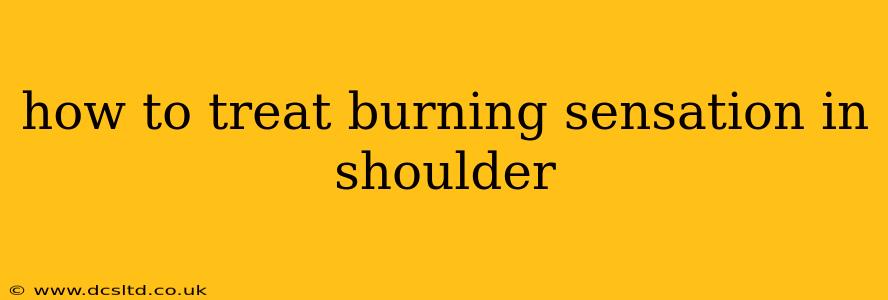A burning sensation in your shoulder, also known as shoulder burning pain, can be incredibly uncomfortable and debilitating. It can range from a mild discomfort to a sharp, intense pain, significantly impacting your daily activities. Understanding the potential causes and effective treatment options is crucial for finding relief. This guide will explore various methods to alleviate shoulder burning pain, helping you find the best approach for your specific situation.
What Causes a Burning Sensation in the Shoulder?
Pinpointing the exact cause of your shoulder burning pain is vital for effective treatment. Several conditions can trigger this symptom, including:
- Bursitis: Inflammation of the bursae (fluid-filled sacs that cushion the shoulder joint) can cause a sharp, burning pain. Repetitive movements or overuse are common culprits.
- Tendinitis: Inflammation of the tendons surrounding the shoulder joint. Similar to bursitis, repetitive actions can lead to tendinitis and a burning sensation.
- Rotator Cuff Tear: A tear in one or more of the rotator cuff tendons can result in significant pain, including burning. This often occurs due to trauma or overuse.
- Cervical Radiculopathy (Pinched Nerve): A pinched nerve in the neck can radiate pain down the arm and into the shoulder, sometimes manifesting as a burning sensation.
- Thoracic Outlet Syndrome: Compression of nerves and blood vessels between the collarbone and first rib can cause pain, numbness, and burning in the shoulder and arm.
- Arthritis (Osteoarthritis or Rheumatoid Arthritis): Degeneration of the shoulder joint cartilage can cause pain, stiffness, and a burning sensation.
- Referred Pain: Pain originating from another area, such as the heart or lungs, can sometimes be felt in the shoulder.
Home Remedies for Shoulder Burning Pain
Before seeking professional medical attention, several home remedies may provide temporary relief:
- Rest: Avoid activities that aggravate the pain. Give your shoulder ample time to rest and recover.
- Ice: Applying ice packs for 15-20 minutes at a time, several times a day, can help reduce inflammation and pain. Never apply ice directly to the skin; use a thin towel as a barrier.
- Heat: After the initial inflammation subsides, applying heat can help relax muscles and relieve pain. Use a heating pad or warm compress for 15-20 minutes at a time.
- Over-the-Counter Pain Relief: Nonsteroidal anti-inflammatory drugs (NSAIDs) like ibuprofen or naproxen can help reduce pain and inflammation. Always follow the dosage instructions on the label.
- Gentle Stretching and Exercises: Once the acute pain subsides, gentle range-of-motion exercises can help improve mobility and reduce stiffness. However, avoid any movements that cause pain. Consult a physical therapist for guidance on appropriate exercises.
When to See a Doctor
If your shoulder burning pain persists despite home remedies, worsens, or is accompanied by other symptoms like fever, weakness, or numbness, it's crucial to seek medical attention. A doctor can accurately diagnose the underlying cause and recommend appropriate treatment.
What are the different types of shoulder pain?
Shoulder pain can manifest in various ways, each potentially indicating a different underlying cause. The pain might be sharp, dull, aching, throbbing, or burning, and its location and intensity can vary. For example, a sharp, sudden pain might suggest a rotator cuff tear, while a dull, aching pain could indicate arthritis. The presence of accompanying symptoms like numbness, tingling, or weakness further aids in diagnosis.
How long does it take for shoulder pain to heal?
The healing time for shoulder pain varies greatly depending on the underlying cause and the severity of the condition. Minor injuries like muscle strains might heal within a few weeks with rest and home remedies. More serious conditions like rotator cuff tears or arthritis may require more extensive treatment and take several months or even longer to heal completely. Prompt medical attention and adherence to the prescribed treatment plan are crucial for optimal healing time.
What are some effective treatments for shoulder pain?
Treatment for shoulder pain depends heavily on the underlying cause. Options include:
- Physical Therapy: This involves exercises and stretches to improve range of motion, strengthen muscles, and improve overall shoulder function.
- Medication: NSAIDs, corticosteroids, or other pain relievers may be prescribed.
- Injections: Corticosteroid injections can reduce inflammation, while other injections might be used for diagnosis or treatment of specific conditions.
- Surgery: In severe cases, surgery may be necessary to repair a torn rotator cuff, replace a damaged joint, or address other underlying issues.
Remember, this information is for general knowledge and shouldn't replace professional medical advice. Always consult a doctor or other qualified healthcare professional for diagnosis and treatment of any medical condition.
